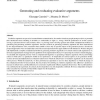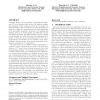134 search results - page 24 / 27 » Knowledge and communication: A first-order theory |
125
click to vote
AI
2006
Springer
15 years 1 months ago
2006
Springer
Evaluative arguments are pervasive in natural human communication. In countless situations people attempt to advise or persuade their interlocutors that something is desirable (vs...
129
click to vote
INFOCOM
2010
IEEE
15 years 8 days ago
2010
IEEE
—Delay Tolerant Networks (DTN) are networks of self-organizing wireless nodes, where end-to-end connectivity is intermittent. In these networks, forwarding decisions are generall...
124
click to vote
WWW
2006
ACM
16 years 2 months ago
2006
ACM
The asymmetry of activity in virtual communities is of great interest. While participation in the activities of virtual communities is crucial for a community's survival and ...
124
click to vote
MOBIHOC
2008
ACM
16 years 1 months ago
2008
ACM
Dealing with interference is one of the primary challenges to solve in the design of protocols for wireless ad-hoc networks. Most of the work in the literature assumes localized o...
125
click to vote
SIGCSE
2009
ACM
15 years 8 months ago
2009
ACM
Jeannette Wing’s call for teaching Computational Thinking (CT) as a formative skill on par with reading, writing, and arithmetic places computer science in the category of basic...


